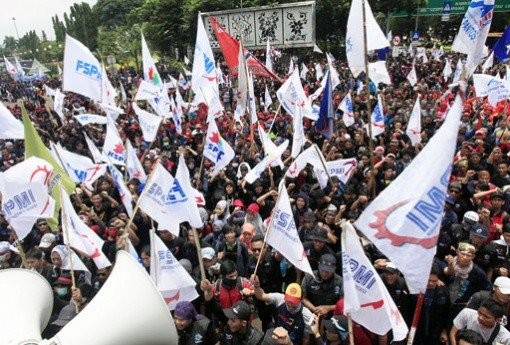Popular Reads
Top Results
Can't find what you're looking for?
View all search resultsPopular Reads
Top Results
Can't find what you're looking for?
View all search resultsLayoffs no longer first option
Change text size
Gift Premium Articles
to Anyone
T
he use of natural waste, in the form of husks and shells from tobacco, cashew and coconut production, as fuel for electricity generation — replacing coal — has helped Semen Indonesia, the nation’s largest cement maker, make a major saving in its operating costs.
So why lay off workers when there are other ways to cut costs?
This is the thinking behind many Indonesian corporations these days, which have been racking their brains to squeeze costs without laying off their employees amid difficult economic conditions.
When 77,787 workers were laid off in 2014 and 48,843 more in 2015, purchasing power weakened in the domestic, consumer spending-reliant, economy, which saw growth slowing to a six-year low last year.
This year, only 8,733 employees saw their jobs terminated from January to August, according to data from the Manpower Ministry.
Most companies have resorted to the use of technology and boosting worker productivity rather than simply opting for layoffs to cut costs, as they grapple with weak demand that has squeezed their income, according to corporations and consulting firms contacted by The Jakarta Post.
“Our energy-related costs hovered around 60 percent of overall costs so we prioritized making them more efficient,” said Agung Wiharto, corporate secretary of state-owned Semen Indonesia, highlighting energy as the focus of the company’s cost-saving measures.
The company’s plant in Tuban, East Java — operated by subsidiary Semen Gresik — now uses husk and tobacco waste for electricity generation. Another plant in Pangkep, South Sulawesi — operated by subsidiary Semen Tonasa — has also replaced coal with coconut shells and cashew-nut waste.
As a result, Semen Indonesia’s costs of revenue dropped 2 percent year-on-year in the first half of this year to Rp 7.5 trillion (US$ 577.5 million). At the same time, net profits dropped 10 percent to Rp 2 trillion as a result of a 1.3 percent decrease in revenue to Rp 12.5 trillion amid weak demand and tight competition.
For the country’s biggest coal producer Kaltim Prima Coal, the widespread shift to abandon coal in favor of cleaner and greener materials to generate electricity has increased the pressure.
To cut costs, the subsidiary of publicly listed miner Bumi Resources has gone the extra mile in renegotiating all contracts with suppliers and contractors by preferring longer-period contracts and bigger coal volume in order to achieve discounted prices.
In the past three years, it has also carried out efficiency measures in the use of machinery, saving on fuel costs and optimizing coal production and shipment, among other efforts. These led to a 15.8 percent decrease in costs last year alone.
“No workforce cut,” said the company’s chief finance officer Ashok Mitra. “We are already the number-one coal producer in Indonesia with the lowest costs.”
To incentivize workers to raise their productivity, employees of Kaltim Prima Coal are given time off when the production target has been reached — a major change that has reduced average working hours to 10 hours per day, from 12 hours previously.
Most firms try to increase labor productivity and the use of digital technology during unfavorable conditions, said McKinsey Indonesia partner Khoon Tee Tan, whose expertise is in oil and gas companies’ strategy, organization and capacity building. “They are investing in people and technology rather than cutting staff,” he said, adding that a lot of companies were focusing on how they could go further in the downstream sector to add value.
Although layoffs are among the available options, several firms have chosen instead look for ways to improve productivity, said Yulius, partner and managing director of Boston Consulting Group’s Indonesian operation.
“The number-one objective should not be reducing the workforce but improving productivity. To improve productivity you need operational improvements,” he said, adding that technology disruption should be seen as an opportunity to improve the workforce’s skills.
The improvements are needed, he went on, because companies have to start thinking about how to grow and compete not only in the domestic, but also the global, market.
“Many of our clients grew very rapidly in the last 10 years and they had no time to take a step back and look at their operations,” Yulius said, adding that many companies were faced with the issue of corporate bureaucracy, which causes inefficiency and adds costs.
“This downturn is a time for clients to reassess their operations and find where the fat lies and to make themselves lean.”
___________________________
To receive comprehensive and earlier access to The Jakarta Post print edition, please subscribe to our epaper through iOS' iTunes, Android's Google Play, Blackberry World or Microsoft's Windows Store. Subscription includes free daily editions of The Nation, The Star Malaysia, the Philippine Daily Inquirer and Asia News.
For print subscription, please contact our call center at (+6221) 5360014 or subscription@thejakartapost.com










